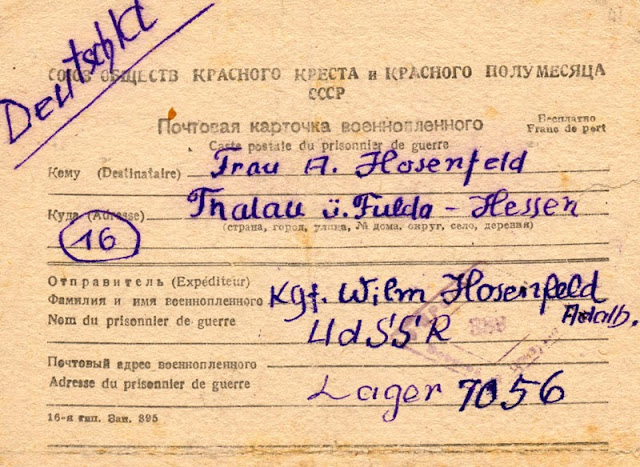Wilhelm (Wilm) Hosenfeld
Germany
Wilhelm Hosenfeld was born in a village in Hessen, Germany, in 1895. His family was Catholic and he grew up in a pious and conservative German patriotic environment. After serving as a soldier in World War I, he became a teacher, and taught at a local school. By the time World War II broke out, Hosenfeld was married and had five children.
Hosenfeld, Warsaw, April 1942
Two pages from the diary of Hosenfeld from the year 1942
Letter Hosenfeld sent to his family from the Soviet POW camp
In January 1945 Hosenfeld was taken prisoner by the Soviets. Five years later, on 7 May 1950 a military tribunal in Minsk sentenced him to 25 years in prison. The trial, so the one-page verdict stated, was held in the absence of the defense. The verdict stated that Hosenfeld had personally interrogated prisoners during the Warsaw uprising and sent them to detention, thereby strengthening Fascism in the struggle against the Soviet Union.
A drawing of Hosenfeld by a fellow prisoner of war, Bobruisk, April 1947
Six months after the trial, in November 1950, Leon Warm came to visit Hosenfeld's wife in Thalau. A Polish priest who had met Hosenfeld in the POW camp had found him and told him of his rescuer's predicament. Warm, who was about to emigrate from Europe, also wrote a letter to Szpilman in Warsaw. It seems unlikely that something could have been done by the two survivors who had lost their families and who were, like others, working hard to pick up the pieces and try to build a life in a world that had little interest in the Jewish tragedy. Hosenfeld died in a Soviet prison in 1952.
Letter Hosenfeld wrote to his wife on 23 July 1942 -
the time of the beginning of the deportations from Warsaw
the time of the beginning of the deportations from Warsaw
Szpilman applied to Yad Vashem in 1998 to have his rescuer recognized. By that time Leon Warm had already died, but his letter to Szpilman survived, and his sister wrote to Yad Vashem from Australia, confirming her brother's rescue. Before the Commission for the Designation of the Righteous could award the title, it had to be verified that Hosenfeld had not been involved in war crimes. Once his diaries and letters were made public, the case was submitted for the Commission's review. Yad Vashem also received confirmation from the Polish Commission for the Investigation of Nazi Crimes that his conduct had been untarnished.
On 25 November 2008, Yad Vashem recognized Wilhelm Hosenfeld as Righteous Among the Nations.
Copyright © 2013 Yad Vashem The Holocaust Martyrs' and Heroes' Remembrance Authority







No comments:
Post a Comment